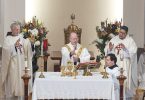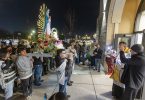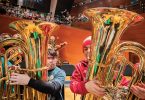John Kennedy was a source of pride for Catholics — and then suddenly, he was gone
by Joe Bollig
joe.bollig@theleaven.org
For many members of Generation X and Generation Y, this Nov. 22 is just another date on the calendar. It’s one day closer to Thanksgiving, and nothing more.
But to members of another generation — call it “Generation K,” the Kennedy Generation — the date is fraught with meaning.
Today is the 50th anniversary of the assassination of President John F. Kennedy at 12:30 p.m. on Fri., Nov. 22, 1963, at Dealey Plaza in Dallas.
One moment the young and popular president was smiling and waving at the welcoming crowd from his roofless limousine. The next, he was slumped over, bloodied, held by his wife Jackie while the car raced to Parkland Memorial Hospital.
On television, Walter Cronkite reported on CBS at 12:40 p.m. of the assassination attempt. Cronkite confirmed the president’s death at 2:38 p.m.
“I was stationed out at St. Joseph of the Valley [Parish] and had just come home from teaching religion at Immaculata High School [in Leavenworth],” said Father George Bertels, now retired and living in Leavenworth.
“I was sitting there eating a bite, and I heard it on the radio,” he continued. “The first thing that came to mind was, ‘This has never happened to the United States. It’s happened all around the world, but not the United States.’ There was almost unbelief on my part. It was really a shock, as far as I was concerned.”
Like many Catholic Americans, Father Bertels was a Kennedy fan and very proud of the first Catholic president of the United States.
“I was studying in Washington, D.C., while [John F. Kennedy] was in the U.S. Senate, and he was an idol for us young priests,” said Father Bertels. “He was an inspiration.”
Msgr. Michael Mullen also taught religion at Immaculata High School. He remembered the principal, Sister Dolorine Eakes, SCL, calling a special assembly for all students to pray for the president.
“There was total shock,” said Msgr. Mullen. “One thing you have to remember is that, in 1963, we were in a Cold War tussle with the Soviet Union over the Cuban missile situation. Fidel Castro came to power [in Cuba] in 1959. We were very concerned that he had an affiliation with the Soviets.”
A large number of students belonged to military families at nearby Fort Leavenworth, with its Command and General Staff School, so the school was always aware of the military.
“It was sad,” said Msgr. Mullen. “I liked him as a president. He was popular. He was a good orator when he spoke.”
Msgr. Charles McGlinn, pastor of Curé of Ars Parish in Leawood, was studying at St. Thomas Seminary in Denver in November 1963.
“We were in a very boring class — Latin, I think,” recalled Msgr. McGlinn.
“Someone came into the class and announced it. It was riveting. For the rest of the day, all of us were in the rec hall — the only building on campus where we could watch TV. Classes were canceled and we watched.”
Assassinations in those days were something that happened to minor figures in obscure Third World nations, not the United States. It seemed surreal.
“It was a shock,” said Msgr. McGlinn. “The whole nation was in shock. There was real mourning, palpable grieving. We experienced it at the seminary. My family [at home] experienced it. It was a really devastating kind of thing.”
Father Thomas Kearns, now retired, was a young associate pastor at Christ the King Parish in Kansas City, Kan. He was having lunch with pastor Msgr. Michael J. Price at a little bar and grill a half block from the parish when the news came through.
“Monsignor and I were in one room, and there was a TV on in the bar next door,” said Father Kearns. “And I thought I heard something different [from regular programming.]
“It was the announcer saying that President Kennedy had been shot.”
It was the monsignor’s day off. And, as was his custom, he invited the associate pastor to accompany him to a movie at the Electric Theater. Father Kearns doesn’t remember the movie, but he remembered how an usher was crying when they left the theater.
The two priests asked the usher why he was crying and he told them that the president had died. Then Msgr. Price began to cry. Father Kearns kept his composure as they walked to the car.
“I was raised a Democrat, and my dad was a union man,” said Father Kearns.
“Kennedy was a very important person in my family. Msgr. Price was Irish and so was I. We were both proud of Kennedy.”
Catholics were proud of their first Catholic president. Until Kennedy came along, it was a given truth that no Catholic could be elected president of the United States. But he did it, and it seemed like a new era had arrived. Catholics in America had arrived.
“Everyone had a lot of hope that he broke the glass ceiling for Catholics,” said Father Bertels. “At that time, Catholics even changed their last names to get a job. There was that prejudice, and that fear.”
“There was exhilaration [at Kennedy’s election],” said Msgr. McGlinn. “One of our boys was able to be president. And I think there was a lot of admiration for what Kennedy stood for, the ideals he espoused caught the hearts of a lot of us. The whole tenor of the country was changing. It was kind of a revolutionary period in the culture, and he was an exciting part of it.”
And it all changed in a single afternoon. All Americans — not just Catholics and ethnic Irish — felt the loss of President Kennedy, regardless of political affiliation.
“I think, in the atmosphere of a great tragedy, it didn’t matter whether you were a Democrat or a Republican,” said Father Kearns. “Your president had been killed. He was still your president, and he had been taken.”






